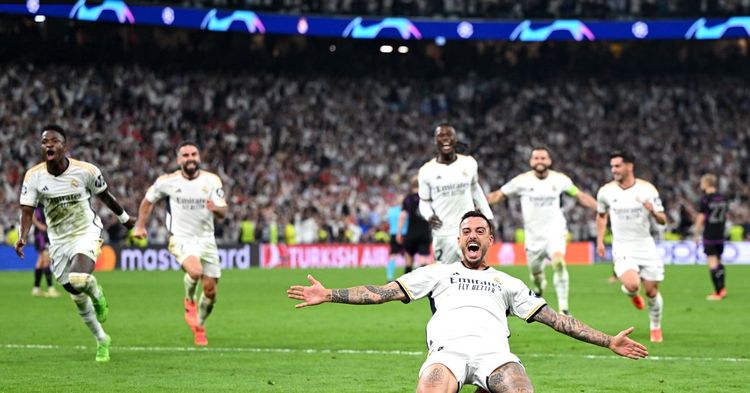Three questions and three answers from Real Madrid 2-1 (4-3 agg ...

Real Madrid secured a spot at Wembley as they overcame Bayern Munich with a 2-1 comeback to win 4-3 on aggregate in the Champions League semi-final second leg. Alphonso Davies had given the Germans the lead, but a late double from Joselu, striking in the 88th and 91st minutes, allowed Los Blancos to book their place in London in June with a magnificent comeback at the Estadio Santiago Bernabéu.
Three answers1. Who would start in defence alongside Antonio Rüdiger?
Carlo Ancelotti may have been going round in circles debating his only real selection decision, which was who to choose in defence. Nacho, the captain who performed admirably in Manchester with the pressure on and in the first leg in Munich, got the nod, with Aurélien Tchouameni selected in midfield ahead of Eduardo Camavinga. Nacho’s experience on these big European nights would prove to be crucial, particularly against another experienced elite player like Harry Kane. The English forward was not at his best, particularly with his sloppy passing, but was kept under tight control by a Nacho who stuck to him at all times. His leadership on the pitch was evident, particularly as the team fought for a comeback and he contested every refereeing decision and looked to chase any Bayern players trying to waste time.
2. Would Real Madrid be able to control the Bayern counter?
If Real Madrid were full of confidence, there was an ounce of fear over the potential of Bayern’s rapid transitions that produce such a significant threat. “I think these two teams are very good at transitions with high quality players who are quick, they are the most dangerous teams in Europe in that sense,” Carlo Ancelotti said in his pre-match press conference. As was expected, Bayern sat deep and invited Real Madrid to dominate so that they could hit on the counter, a tactic which worked well at times but which reflected an approach in which neither side were willing to gamble and risk being the first to concede. On one occasion, it did catch Real Madrid out, allowing Alphonso Davies to score on the break with Dani Carvajal pulled out of position and Davies getting in behind, costing the hosts dearly. Other than that, it was well handled by Real Madrid.
3. Would Real Madrid reach an 18th Champions League final?
The question that all of Europe was asking, and the answer is yes. It will be Real Madrid’s third final against German opposition, with the two previous opponents being Eintracht Frankfurt in a 7-3 win in 1960 and Bayer Leverkusen with a 2-1 victory in 2002. In doing so, the team went one better than 2016/17 in avoiding defeat in every match on the way to a Champions League final, going 12 games unbeaten in the same season. In 2017, defeat at the Calderón against Atleti in the second leg had no impact on the aggregate result, but brought the streak to an end. It also means that Real Madrid will travel to Wembley Stadium for only the second time, having previously visited for a 3-1 Champions League group stage defeat to Tottenham while the London club’s new stadium was rebuilt in 2018.
Three questions1. Joselu Ballon d’Or?
There were groans around the Estadio Santiago Bernabéu when Carlo Ancelotti brought on Joselu to replace Rodrygo Goes as Real Madrid looked for an equaliser. He’s a forward who has struggled for goals in recent months, but he’s a poacher in the box who knows exactly where the goal is and was looking to operate as a target man in the way he knows how. Coming on with nine minutes left on the clock, he scored with his only two shots, both inside the six yard box, as he gambled on every loose ball, with the first paying off as Manuel Neuer spilled it into his feet. It then happened again as he took a risk with Bayern’s defensive line moving out as he went right to the line to get onto the Antonio Rüdiger cutback to put the ball into the net and spark euphoric scenes at the Bernabéu. Maybe he’s not quite at Ballon d’Or level, but he may have just earned himself a contract for next season with that contribution off the bench to book a place in the Champions League final.
2. Would this be the first of many Bernabéu appearances from Alphonso Davies?
Bayern were forced into an injury change on 26 minutes as Serge Gantry was left with no choice but to come off, and Thomas Tuchel opted to make the unexpected switch by bringing on Canadian full-back Alphonso Davies in a more attacking role as a left winger. Few expected that he would have such an impact. Davies has been strongly linked with a move to Real Madrid, as soon as this summer, despite some poor form in recent months, but ran Dani Carvajal into the ground with his pace and trickery. It was his positioning that helped to catch out Carvajal and gave Bayern the lead, getting in to that gap which allowed him to attack against reduced numbers and then powered home a fine finish. The Bernabéu will welcome him back.
3. Was Jude Bellingham fit enough?
Reports emerged on Wednesday afternoon that Jude Bellingham had undergone injections into his knee with pain-killers to help him to play through the pain barrier in this game. The Englishman was below par, and while he had some moments of incredible technical ability, he did not look to be at his best. His bursting runs were absent, and he was instead hanging around in the right spaces, but was slow to react and lacking that element of surprise that has caught out so many defences this season. Having him fit again and back at his best for the final in London will be crucial, particularly as its up against his former club in Borussia Dortmund.

















































